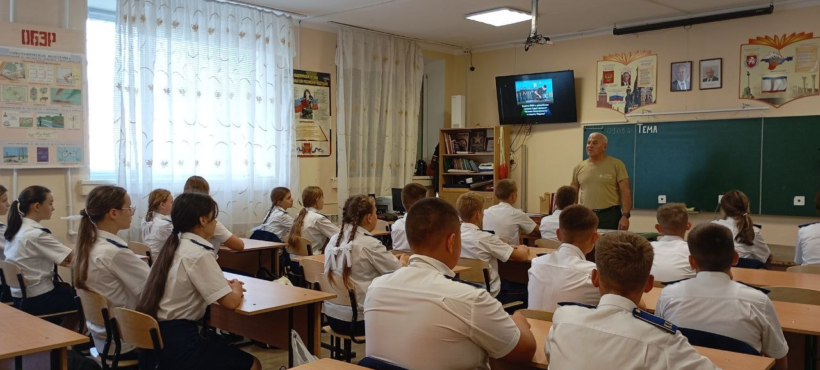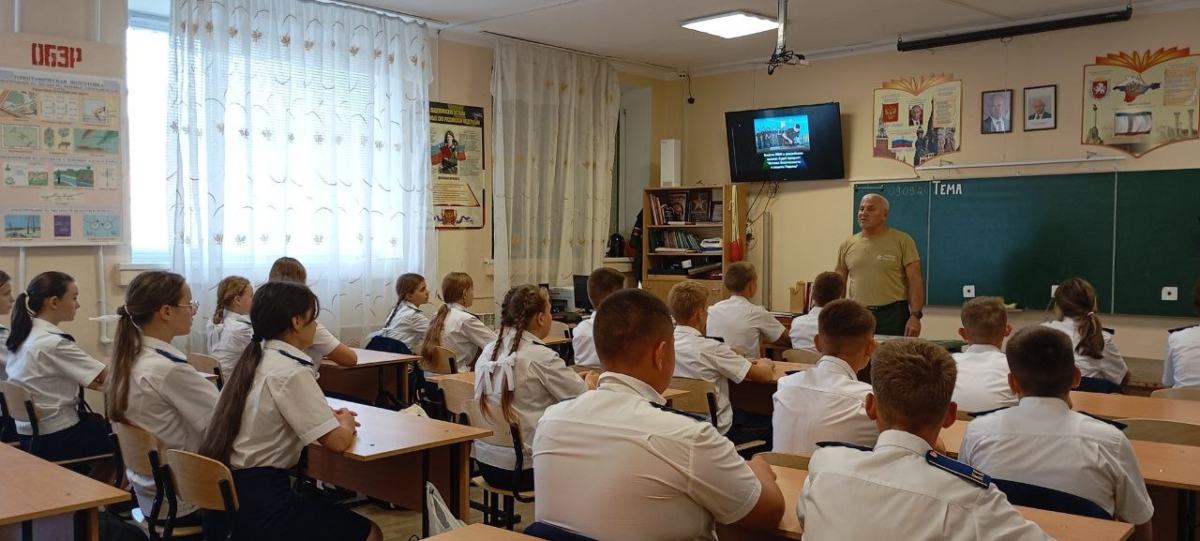

How the academic year 2024/2025 started in the occupied Crimea: a lesson with Putin, militaristic events
Education figures under occupation (TOT of the Autonomous Republic of Crimea and the city of Sevastopol):
- 500,060 children aged 0-17 (as of 01.01.2024)
- 285,000 pupils/ 608 schools
- over 100,000 preschoolers/ 509 kindergartens
- More than 27,243 children are members of the Yunarmiya movement
- 22,000 children – participants of the ‘Movement of the First’
There are more than 285,000 school-age children in Crimea. In the context of the Russian occupation of the Autonomous Republic of Crimea and the city of Sevastopol, the educational process is used as a powerful tool to influence children to erase their Ukrainian identity and form loyalty to the occupation authorities.
This process continues, becoming increasingly large-scale and aggressive: the school curriculum is based on the promotion of Russian state ideology and the increased militarisation of young people.
The lesson taught by Putin
The school year 2024/2025 in the TOT began with the traditional lesson ‘Talking about Important Things’, which was held by the President of the Russian Federation at secondary school No. 20 in the Russian city of Kyzyl. This ‘event’ was broadcast online and viewed by students across Russia, including children in the TOT of the Autonomous Republic of Crimea and the city of Sevastopol. Although the topic of the lesson was formally dedicated to the Day of Knowledge, Putin spent a lot of time talking about the so-called Armed Forces, in particular, about ‘achievements in liberating Donbas from Ukrainian militants’. Answering a student’s question about preparing for military service, the Russian President noted the ‘nobility’ of such thoughts and mentioned the school subject ‘Fundamentals of Security and Defence of the Motherland’, which is supposed to provide such training, as well as participation in the ‘Yunarmiya’ and cadet education. He also stressed the need to expand the practice of military training for children in the form of camps. This message, coming from the highest leadership of the Russian Federation, has a particular impact on shaping children’s worldview – it reinforces the idea that service in the Russian armed forces is desirable and necessary for the younger generation, and that the militarisation of education is a demanded and necessary step.
Background. Since the 2022/2023 academic year, the first lesson on Mondays in all Russian schools, including those in the TOT, has been ‘Conversations about Important Things’. The main topics are related to key aspects of life in modern Russia that actually glorify its culture and history, heroise the military and justify wars started by the aggressor country. Attendance at these lessons is compulsory for children, and skipping them without a valid reason is regarded as truancy. At the central level of the Russian Federation, before the start of the new school year, lesson topics are developed with methodological materials for teachers, which are published on the website https://razgovor.edsoo.ru/. This indicates that ‘Conversations about Important Things’ are a carefully planned part of Russia’s overall state policy. The fact that they are conducted according to unified guidelines allows for centralised control over the content of the lessons presented to students and ensures that these lessons are in line with official propaganda and political narratives.
Talking about important things on Teacher’s Day
In September 2024, five ‘Conversations about Important Things’ will be held, including a video with Russian Presidential Aide Vladimir Medinsky on 30 September 2024, on Teacher’s Day. He is also the author of the only history textbooks in which historical events are rewritten to fit Russian propaganda and include a section on the so-called ‘illegal armed conflict’. In addition, the methodological recommendations state that before moving on to the teacher’s topic, ‘let us recall that exactly two years ago, as a result of a referendum, the Donetsk and Luhansk People’s Republics, Zaporizhzhia and Kherson regions were reunited with the Russian Federation’. The following is an excerpt from this document:
It would seem that there could be nothing ideological about classes dedicated to Teacher’s Day. However, here, too, this topic was artificially and deliberately linked to the so-called ‘reunification of the primordially Russian lands’. This once again confirms that Russia is using every opportunity to promote its own narratives.
How children in the TOT of the Autonomous Republic of Crimea and Sevastopol are trained to serve in the Russian army
In 2024, the subject ‘Fundamentals of Security and Protection of the Motherland’ was introduced in Russia, and, accordingly, in the TOT of the Autonomous Republic of Crimea and the city of Sevastopol. It is designed for students in grades 8-9 and 10-11, with nearly 170 hours of study time allocated to it, and will replace its ‘predecessor’, the subject ‘Fundamentals of Safety and Life’. The programme includes military training, including: the ability to handle weapons, drones and their use in modern combat; the basics of tactics and strategy; and lessons on ‘defending the homeland’. Particular emphasis is placed on fostering a positive attitude towards Russian military operations. In addition to theoretical lessons, there will be training sessions and practical skills training.
In a video by the Russian Ministry of Education dedicated to this subject, Igor Muravlyannikov, head of the military education department of the main personnel directorate of the Russian Ministry of Defence, says:
‘We have set ourselves the goal of ensuring that our boys, our younger generation, clearly and distinctly understand the role of our state in ensuring international security, everything related to the defence of the state (note: RF) from the point of view of the armed forces. This is the basic knowledge that any citizen needs to feel like a patriot, a defender of the fatherland.’ (author’s translation)
In other words, by teaching this subject in the TOT, Russia is actually preparing a military reserve from Ukrainian children, which is a violation of international law. At the same time, the role of the Russian Federation in ensuring international security is emphasised, thus justifying the country’s military aggression as part of the protection of state interests.
Schools in the occupied Autonomous Republic of Crimea were preparing to introduce a ‘new’ subject. For example, in Simferopol’s secondary school No. 5, with the support of the State Duma deputy Yuriy Nesterenko (United Russia faction), a shooting range was restored for practical training in the subject. According to the latter, it is necessary to ‘involve members of the military to teach. They, like no one else, can come and tell the truth.’
As planned, in the TOT of the AR of Crimea and Sevastopol, classes on ‘Fundamentals of security and defence of the homeland’ began on 01.09.2024: there is information that in September children will study the military ranks of the RF Armed Forces and hold a class on ‘Defence of the country as a prerequisite for the development of the country’.


.
Support for the ‘SMO’, militaristic activities and the Russian propaganda diary.
Sevastopol continues the ‘tradition’ of publishing paper diaries for schoolchildren, which began in 2007. This year’s edition is dedicated to the 80th anniversary of the ‘great victory’. And, of course, there is a spread with the image of Russian President Putin against the backdrop of the Kremlin and the words of the Russian national anthem
With the start of the school year, assemblies and other activities in support of the members of the so-called ‘separatist forces’ resumed in schools in the TOT of the Autonomous Republic of Crimea and Sevastopol:
- At the initiative of the members of the ‘Movement of the First’ and ‘Volunteers of Victory’ together with the so-called advisor to the director for educational work, Elizaveta Mandryka, Yalta School No. 7 actively joined the campaign to collect waste paper to support the military fighting against Ukraine;
- under the leadership of the ‘advisor to the director for educational work’ Gotz Y. I. and the pseudo-deputy director Ibrahimova A. S., students of the Chistensk school-gymnasium named after Tarasyuk. Tarasyuk were involved in collecting humanitarian aid for the participants of the so-called ‘armed conflict’;
.
- in the Stepanivska school of Pervomaisk district in the TOT of Crimea, recorded a video message of the ‘eagles’ with words of support to the Russian military. It should be noted that the Eaglets of Russia project involves children in grades 1-4.
In addition, in September 2024, the Police Cadets team from school No. 28 in Simferopol Simferopol, took part in the military-patriotic game ‘Zarnitsa 2.0’, which took place in the Volgograd region of the Russian Federation. The children brought home ‘prizes’ in firearms training; engineering equipment and position camouflage; and the basics of countering and controlling UAVs.




The material was prepared by the Centre for Civic Education “Almenda” as part of the project “Childhood Unchained: Standing Against Occupation`s Impact”. The project is implemented with the financial support of the Ministry of Foreign Affairs of the Czech Republic as part of the Transition Promotion Programme. The views expressed in this report are those of the authors and do not reflect the official position of the Ministry of Foreign Affairs of the Czech Republic



